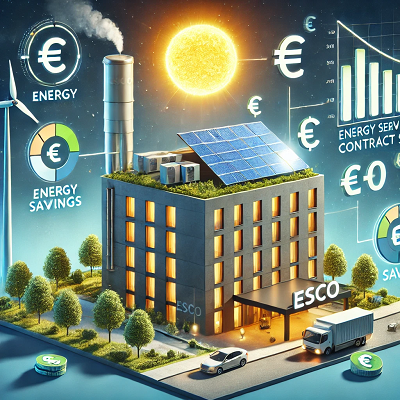ESCO SERVICES

Providing ESCO (Energy Service Company) contract services for solar thermal systems involves managing the installation, operation, and maintenance of solar thermal systems for buildings, while guaranteeing energy savings and efficiency.
ESCOs typically deliver energy-saving projects and are compensated based on the energy savings achieved. When applied to solar thermal systems, this model can bring financial and environmental benefits to all parties involved.
Solar Thermal ESCO Contracts
Netgreen.eu OU aims to combine our expertise in the area of Solar Thermal Energy systems and HVAC Design to provide ESCO Services. ESCO contracts for solar thermal systems offer a win-win situation by providing energy cost savings, risk management, and environmental benefits to building owners, without the building owner having to raise the investment capital to install the solar thermal system. The ESCO methodology involves an energy audit, system design, performance guarantees, financing, and long-term maintenance, making it an attractive solution for driving sustainability in the built environment.
Objectives of Providing ESCO Services for Solar Thermal Systems:
Methodology of Implementing an ESCO Contract for Solar Thermal Systems:
Energy Service Company (ESCO) contracts for solar thermal systems installed on buildings, such as hotels in Portugal, can offer significant benefits and follow a structured process. These contracts are designed to promote energy efficiency, reduce operating costs, and enhance sustainability through renewable energy solutions like solar thermal systems.
Advantages of ESCO Contracts for All Parties Involved:
ESCO contracts for solar thermal systems offer a win-win situation to all Parties involved, by providing energy cost savings, risk management, and environmental benefits to building owners, while also creating business opportunities for ESCOs. The methodology involves an energy audit, system design, performance guarantees, financing, and long-term maintenance, making it an attractive solution for driving sustainability in the built environment.